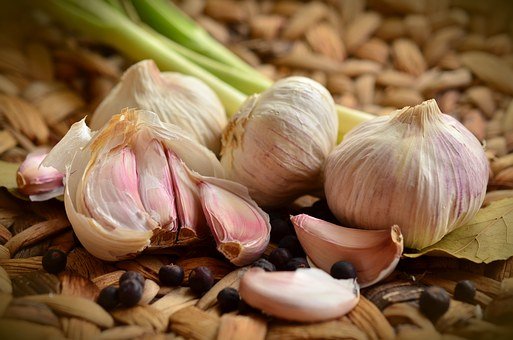What Are the Side Effects of Eating Too Many Garlic Cloves?
Garlic comes as a plump package of individual cloves that once cut, reek of its beneficial properties. Garlic has been used for thousands of years as an antiseptic and healing agent. The Food and Drug Administration classifies garlic as a low toxicity herb and Generally Recognized As Safe, or GRAS. However, you should be aware of possible side effects, and discuss its use as a complementary dietary supplement with your doctor if you are taking medications.
Social Side Effects
Eating more fresh garlic per day than one or two cloves, as recommended by Ellen Tattelman in "American Family Physician," results in a garlic smell on the breath as well as a pungent aroma exuded through the skin. Recent research, published by Areerat Hansanugrum, M.S., et al. in the "Journal of Food Science", suggests that whole milk is an effective counter to garlic breath, particularly when taken with the garlic. However, if you're taking large amounts of garlic for its documented beneficial effects, M. Koseoglu, et al. suggested in "Phytotherapy Research" that garlic tablets might be preferable.
Gastrointestinal Effects
Eating raw garlic has been shown to cause gastrointestinal discomfort as well as flatus, nausea, and possibly, diarrhea. Mayoclinic.com and the University of Maryland Medical Center reinforce these findings, with Steven D. Ehrlich at Maryland citing rarer cases of headaches and migraines, allergic and asthmatic reactions, lethargy, muscular aches and vertigo.
Skin
Ehrlich cites research that shows freshly cut garlic can burn skin, and that if you handle fresh garlic frequently, you might experience rashes or burns. Jesse Lachter et al. in "Military Medicine," cite two patients who sustained second-degree burns as a result of using raw garlic as a poultice, and the Langone Medical Center at New York University found examples of blistering and third-degree burns caused by raw garlic on skin.
Contraindications
Care is needed when taking garlic if you use medications such as warfarin for its blood thinning properties, or you are under treatment with protease inhibitors included in human immunodeficiency virus treatments. Tattelman et al. suggest that garlic should be excluded from the diet seven to 10 days before surgery to prevent clotting delay or any reactions with anticoagulant therapy that may be prescribed. Discuss your diet and any complementary herbal preparations with your prescribing physician to prevent your medication from being compromised and losing its effectiveness.
References
- https://www.ncbi.nlm.nih.gov/pubmed/20722910
- https://www.aafp.org/afp/2005/0701/p103.html
- https://www.fda.gov/food/food-additives-petitions/food-additive-status-list
- https://www.livestrong.com/article/422068-aged-garlic-vs-fresh-garlic/
- https://www.mayoclinic.org/diseases-conditions/high-blood-cholesterol/diagnosis-treatment/drc-20350806
- https://www.ncbi.nlm.nih.gov/pubmed/19653315

One clove a day is enough.
Cool post!
Hi @hnub
As a follower of @haccolong this post has been randomly selected and upvoted by @hoaithu's Curation Trail.
This is random free upvote daily when you follow @haccolong
To earn more rewards with your Steemit account. Check through some of the ways at this post.
I will continue with random upvotes in the future & wish you lots of luck. :)
Hey @hnub, thanks for sharing. I knew garlic had more uses than just vampires, like high blood pressure. I love it in many dishes mixed with other vegetables.